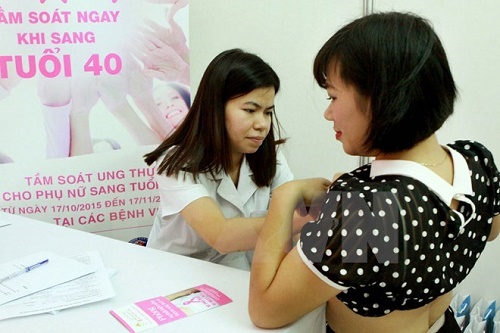Breast cancer prevention in Vietnam reaches positive results
As many as 17,000 women received breast cancer examinations during the past three years in Viet Nam, as a result of a breast cancer prevention and control project, the results of which were released at a conference on January 29.
 |
| Breast cancer examination (Photo: VNA) |
It was Viet Nam's first-ever comprehensive breast cancer prevention and control project, according to the Ministry of Health.
Under the project "We care for her", which was run from 2013 to 2015 in Ha noi, HCM City, Hue, Da Nang and Can Tho by the Supportive Fund for Cancer Patients-Bright Future Fund and the Roche Company, nearly 600 doctors from central and district hospitals received training on breast cancer prevention and treatment.
Five breast cancer patient clubs were also founded.
Two forums for breast cancer patients were organised with 400 patients and medical workers participating.
Associate professor Nguyen Thi Xuyen, Deputy Minister of Health and Chairwoman of the Supportive Fund for Cancer Patients-Bright Future Fund, said that early discovery of breast cancer was vital.
"I believe that increasing understanding about breast cancer is the best prevention and really hope that breast cancer is no longer a big problem to women and they can live a happier life with more information and early detection," she said.
Inge Kusuma, Head of Viet Nam Hoffmann-La Roche's Representative Office, said that she was proud of the results, which exceeded expectations.
But many women across the country needed knowledge about their health, not only about breast cancer, but also other diseases such as ovarian cancer and cervical cancer, she said.
"Please take action together for our beloved women today so that they will not have to worry about the disease tomorrow," she said.
During this year and the coming years, the project will continue to conduct education programmes to increase awareness of common cancers among women.
In Viet Nam, more than 12,500 women suffered from breast cancer in 2010. The number is estimated to reach more than 22,600 by 2020.
(Source: VNA)